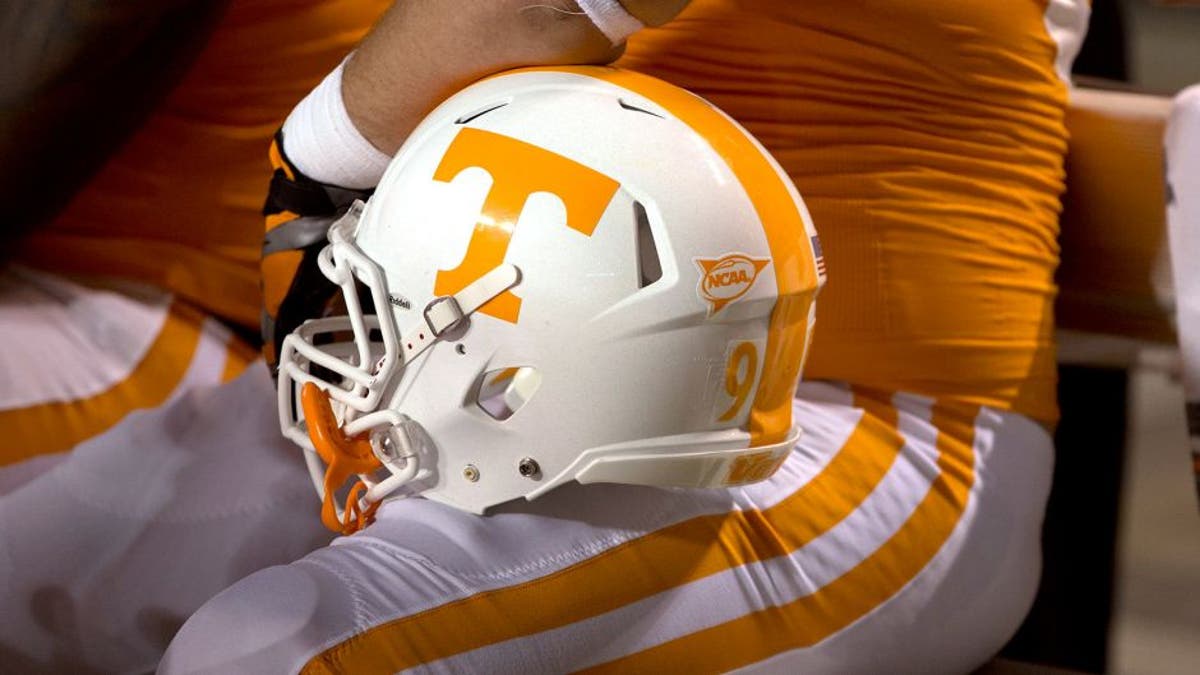
KNOXVILLE, TN - SEPTEMBER 15: A detail view of a Tennessee helmet during a game between the Florida Gators and the Tennessee Volunteers at Neyland Stadium on September 15, 2012 in Knoxville, Tennessee. The Gators defeated the Volunteers 37-20. (Photo by Sheila Hanus/Replay Photos via Getty Images) (Sheila Hanus/Replay Photos via Getty Images, File)
Tennessee is paying $2.48 million to settle a lawsuit filed by eight unidentified women who said the school had violated Title IX regulations and created a "hostile sexual environment" through a policy of indifference toward assaults by athletes.
Lawyers for the school and the plaintiffs issued a joint press release Tuesday announcing the settlement.
"We are satisfied that, while universities everywhere struggle with these issues, the University of Tennessee has made significant progress in the way they educate and respond to sexual assault cases," said David Randolph Smith, the lawyer representing the plaintiffs. "My clients and I are also convinced that the University's leadership is truly committed to continue its exemplary efforts to create a model as it relates to sexual misconduct."
Tennessee's athletic department and the school's central administration will split the cost of the settlement. According to the release announcing the settlement, no taxpayer dollars, student fees or donor funds would be used to fund the settlement, and the funding instead will come "from other income-generating activities within the university."
Tennessee chancellor Jimmy Cheek said he will soon announce a new series of initiatives on campus to improve its Title IX efforts, including additional support and budgeting specifically in areas related to sexual assault, student conduct, education programming and student well-being. UT president Joe DiPietro said he would appoint an independent commission to review existing programs make recommendations addressing the issues of sexual assault and misconduct.
"No university will be able to prevent every incident of students, faculty or staff making bad judgments," Cheek said in a statement. "Like many institutions we are not perfect, but our goal is to continue to be the best we can be at creating awareness, educating, and preventing discrimination and abuse in any form, and to continue to be equally prepared when it does happen and to deal with it promptly, sensitively, fairly and effectively.
"We've come a long way in recent years, and we are working every day to be even better. Our first priority is the safety and well-being of every member of our University community."
The announcement of the settlement comes two weeks after Cheek announced he would step down as chancellor to return to teaching. Cheek's move won't become effective until a successor is appointed. When he announced the move last month, Cheek said it was a personal decision unrelated to the Title IX suit.
According to the release, negotiations toward a settlement "began in earnest in April." The case wasn't scheduled to go to trial until 2018, and the release noted that the cost to litigate the case all the way to trial could have cost as much as $5.5 million. As of June 8, the state had paid over $220,000 in legal fees associated with the lawsuit.
The release also noted that the school "is not admitting guilt, negligence or unlawful acts" as part of the settlement.
Six women filed the suit in federal court in Nashville on Feb. 9. Two more plaintiffs added their names to an amended complaint two weeks later. The original complaint referenced incidents dating back to 1995 to show how the school has historically handled reports of player misconduct, and one paragraph mentioned a sexual harassment complaint made by a Tennessee trainer in 1996 that included an incident involving recently retired quarterback Peyton Manning, who was playing for Tennessee at the time.
The amended complaint included a statement from former Tennessee football player Drae Bowles in which he said he assisted a woman who said she had been raped by two other players and that he later was attacked by teammates and told by football coach Butch Jones that he had "betrayed the team." When the document was filed, Jones responded by saying "the assertion that I ever attempted to belittle or demean a young man for taking action to help another person is absolutely false."
Tennessee reacted to the lawsuit by bringing all its head coaches together for a February press conference in which they defended the culture of the athletic department. Athletic director Dave Hart made similar remarks at a separate press conference two days later.
No athletic officials commented Tuesday night, but the release announcing the settlement included statements from Cheek, DiPietro and Tennessee Board of Trustees vice chair Raja Jubran.
"Settling this case was the right thing to do from a compassionate perspective for the young women involved and from a reputation perspective for the institution, regardless of the merits of the case," Jubran said. "One side ultimately would have won in court several years from now, and we felt confident about our legal position, but I truly believe that both sides would have lost.
"The intangible costs of emotional stress to those involved and the distraction to all of our positive progress at UT, over and above actual legal costs, would have been exorbitant."
Title IX is a federal statute that bans discrimination at schools that receive federal funding. The U.S. Department of Education in 2011 warned schools of their legal responsibilities to immediately investigate allegations of sexual assault, even if the criminal investigation has not concluded.








































